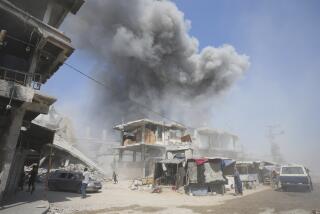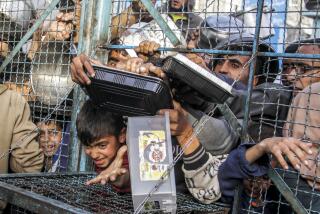Anger Almost Halts Bosnia Mercy Mission : Balkans: U.N. food convoy finally reaches stranded Muslims in Mostar.
- Share via
CITLUK, Bosnia-Herzegovina — The bureaucrats agreed on a pact and the military commanders endorsed it, but in the end it was a small army of singing children and an angry old woman who were nearly the undoing Wednesday of the United Nations’ troubled mission here.
Seeking for the second straight day to reach more than 35,000 stranded Muslims on the brink of starvation in nearby Mostar, a U.N. aid convoy finally rolled forward after being halted for more than six hours on sweltering back roads by dozens of Croatian women and children determined not to see food delivered to their enemies.
Young children joined hands in the road and an old woman threw herself in front of the lead vehicle, effectively halting passage in this small town 12 miles from some of the heaviest fighting in central Bosnia-Herzegovina. The United Nations’ second-in-command for the region, Cedric Thornberry, sat helplessly astride an armored personnel carrier.
Even Bosnia’s Croatian leader, Jadranko Prlic, and Croatian Foreign Minister Mate Granic were booed by a furious crowd as they attempted to intervene on behalf of the 27-truck convoy, destined to aid both Croats and Muslims in the embattled city of Mostar.
But residents of this leafy little town, which is teeming with Croatian refugees from the local fighting, refused to let the convoy pass until the Croatian military command intervened at nightfall. They said they feared that the convoy contained weapons to resupply the Muslims.
“How can we let them go when the fathers of our babies will be shot by the Muslims they’re helping?” demanded a 28-year-old woman with a baby in her arms. “I have nothing against the children, they should be helped, but it’s incomprehensible to feed those who are shooting our husbands.”
The daylong odyssey provided an unsettling picture of how bitter the divisions among Bosnia’s population have become and how helpless the United Nations is to intervene in the hatred. Humanitarian aid is viewed by most parties to the conflict as a guise for keeping the enemy alive to fight another day.
As young children danced and lay down on mats in front of the armored vehicles escorting the aid convoy, U.N. soldiers sat wordless and baking in the afternoon heat while the second round of meetings of the day with Croatian political leaders unfolded in a nearby school.
After more than an hour of negotiations, the convoy passed only after a 70-year-old woman, who had been driven from her home by Muslim forces, was allowed to scramble aboard one of the trucks and inspect the bags of flour for weapons.
The trucks rumbled on but were halted again 10 minutes later in Citluk by an even larger group of protesters. Here, it looked as though they had met their match.
“The Muslim army had invaded our town and killed seven of our soldiers. The U.N. was picking up the Muslim wounded and dead right away, and they left our dead bodies in the woods without even burying them,” said Finka Bagaric, who fled her home in Bugojno three weeks ago. “I don’t want to let the U.N. pass because they are smuggling weapons for our enemies.”
Croatian leaders said they were committed to allowing the convoy to pass, after weeks of blocking U.N. access to embattled Mostar. The city’s Muslims had been without relief supplies since June 15 until a small U.N. shipment was admitted Saturday and U.S. military planes airdropped 11 tons of food into the city Tuesday night.
“I tried to do my best to explain that humanitarian law is the most important and that the humanitarian convoy must go without any preconditions, and not only this one, but all convoys,” Granic said. “But the situation on the ground is a little bit different.”
Only after a military officer intervened nearly two hours later did the crowd permit the convoy to pass through. It was made up of 19 trucks bound for the Muslim side, eight that unloaded on the Croatian side and a macabre accompaniment: a refrigerated truck containing the bodies of nine Croatian soldiers demanded by the Croats as part of an exchange of bodies and prisoners.
U.N. officials said many of the thousands of Muslims stranded on the east side of Mostar were within days of starvation, and many more were dying because there have been no medical supplies. Water is available only from the polluted river, and serious ailments are multiplying.
But Croatian leaders complain that the United Nations has neglected to focus on Croats who are suffering in Muslim-dominated areas of central Bosnia, alleging that Muslims have ethnically cleansed 50 villages in the Konjic area and many others near Zenica, Kakanj, Vares and Bugojno.
“There has always been free access for convoys to Mostar,” Croatian leader Mate Boban told reporters after a meeting Wednesday morning in which Croatian officials initially signed off on the aid delivery. “The Muslims have barricaded themselves in Mostar and haven’t allowed free access. Let them unbarricade themselves.”
An estimated 20,000 displaced Bosnian Croats have packed Citluk since the former Muslim and Croatian allies turned against each other last spring and began bitterly battling for territory in central Bosnia.
Most of the refugees here, driven out of their homes by fighting in Konjic and Bugojno, are living in borrowed housing or crowded into the town’s only school, where they are sleeping on mats on the floor in classrooms and often drinking water from toilets.
More to Read
Sign up for Essential California
The most important California stories and recommendations in your inbox every morning.
You may occasionally receive promotional content from the Los Angeles Times.










